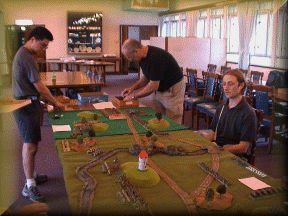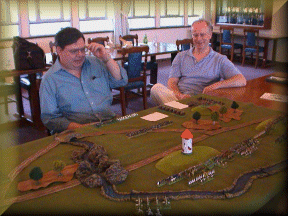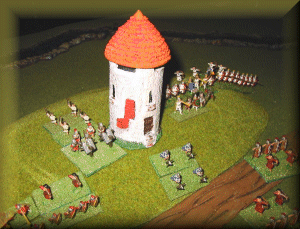The
Battle
of Palamas - A.D. 400
fought
12 October 2002
by
Eric
Hall
As
told by the monk Gildas, ambassador for the Bishop of Alexandria with the
barbarian allies of his most holy majesty the Emperor Arcadius.
Exegi
Monumentum Aere Perennius
ďI
have raised a monument more durable than bronze.Ē
 Such
were the prideful words the Roman Prefect Niellios, general to the false
western magnate Stilicho, had carved on the watchtower at Palamas, in
Thessalia, after his forces repelled the barbarian alliance of the mercenary
Dux Herberti the Hibernian on those pleasing but bloody plains. Such
were the prideful words the Roman Prefect Niellios, general to the false
western magnate Stilicho, had carved on the watchtower at Palamas, in
Thessalia, after his forces repelled the barbarian alliance of the mercenary
Dux Herberti the Hibernian on those pleasing but bloody plains.
I,
Gildas, ambassador and scribe to the Bishop of Alexandria beheld these
things and report to your grace.
On
the fifth day of the fifth month, in the year 400 after the birth of our
Lord, the second army of the invasion force of Stilicho under the General
Niellios was camped outside Palamas near the old Imperial watchtower and
around the rich villa of the famous horse trainer Jockius.
That
false Roman, the Vandal Stilicho, was again laying waste the fine lands of
Greece to draw out those Lords of the Visigoths who had set their
standards before the throne of his majesty Arcadius, in return for lands to
the fifth generation in the wealthy parts of
the northern plains.
Arcadius
had commanded the Visigoth Dukes under his favour to resist this latest
invasion by Stilicho.
Hoping
to shame them into battle and defeat them, so that he could press his claim
as guardian of the Eastern Emperor, as well as of the Western one, Stilicho
succeeded more than he at first hoped.
For
the Visigothic lords, grown away from war after 10 years of settled peace in
their new homes, contracted instead with the roving mercenary general and
exiled Pictii King Herberti the Hibernian and his savage
barbarian bands to find and destroy the Roman armies.
The
Approach
The
land around Palamas is horse pasture with orchards and gardens near the
villas, lines of low and rolling
hills, patches of ancient woodland, and the battle plain is cut with a small
brook, which dives into a rocky gorge between the watchtower and the villa.
Your
servant, Gildas, thinking not of the danger to his own poor body, climbed up
and stood high on a bluff on the left of the barbarian line with the hearth
guard of Herberti as the sun made a proper height and the morning dew had
almost burned from the grass. It was a clear day, and the scent of dogswood,
a sacred plant, hung in the air.
The
blue men of the Pictii are a brave sight to see, but from a distance.
Nay, not even Noxios the Alexandrian hermit savoured so strong as these
warriors, from a land where it is said even the children drink a water which
burns like fire, and men eat only the full intestines of their sheep.
Around
and about me, the warbands of the Pictii advanced in their sloping run over
the hill, and straight for the Roman right wing.
Recognising
him from my travels to Roma two years before, I could see on the rising
ground in front, where the Roman troops were deploying, the distinctive tall
green plumes on the helmet of the experienced Greek general Philo.
Renegade! Had he not taken the salt of Arcadius before?
 To the right, I saw spread out before me the rest of Herbertiís army.
The stern, secretive, and aloof Heruls marched towards the Imperial
watchtower on the low hill in the centre, their thundering noble cavalry
galloping behind, headed for a gap which Niellios seemed to have missed in
his line between the watchtower hill and the brook.
To the right, I saw spread out before me the rest of Herbertiís army.
The stern, secretive, and aloof Heruls marched towards the Imperial
watchtower on the low hill in the centre, their thundering noble cavalry
galloping behind, headed for a gap which Niellios seemed to have missed in
his line between the watchtower hill and the brook.
Beyond
the brook, the wild Saxon wyrd warriors of Wandering Weiyen raised their
wailing warcry and waited for no one in a mad rush forward. The
advancing Roman line, still marshalling from camp, could not reach the
garrison in the villa of Jockius before the first Saxon wave hit.
On
the far right of the barbarian line, the Visigothic paymasters had sent a
contingent under the wily Duke Dieter, to ensure their money was being well
spent. The Duke, alas, had chosen a battle front full of farmed land
next to the villa and the heavy Visigoth horses were making poor progress
through the close vineyards and orchards.
But
the bold Barbarian advance had already been compromised the night before at
the war meet of the mercenary chiefs when Duke Dieter, reluctant to commit
all his countrymen before he saw the fighting skills and temper of
Herbertiís bands, had proposed a long right flank march by half his own
forces, around the Roman left flank.
Herbertiís
spies had told him that the Roman left was strong in regular legionary foot
and horse and under command of the fanatical schismatic General Kristos.
Hearing
this, the Ostrogothic commander Eiricus , yelling that what was good for the
western Goths was good for the eastern Goths, took his own large warbands in
a long march off around the Roman right flank.
King
Herberti, seeing that his reduced forces must win by terror what they had
lost in numbers on the field, gave his only command of the fatal day:
ďCharge, and Iíll kill any bastardís son who doesnít!Ē
Alas, your grace, Niellios had by now had time to deploy along a line of
hills connecting his left and right flanks through the watchtower at the
centre of his line.
Behind
the thin but determined lines of the Western legions, large numbers of
cavalry Alae could be seen in reserve, ready to charge down any of our
warriors who hacked through the lines.
It
was only later that I heard from a good Christian officer of the Palatina,
who I saw next day searching the field, that Niellios, at first sight of our
clamouring hosts, had profaned God and complained that the rules of War were
not always fair. The Lord must have heard him. He works in
mysterious ways.
The
Battle
As
the sun rose toward
noon
, Favour seemed to smile on our warriors. On the left, the wild Pictii
smashed into the troops of Philo, hacking down legionary and auxiliary
alike. Not even a charge by what looked like Guard
cavalry in their red cloaks could throw back the incensed men of the North.
Philo
could be seen clearly, sending rider after rider back to Niellios in the
centre and asking for aid, as all could discern in the distance an ominous
dust cloud, which could only be the bands of Eiricus, Stilichoís main army
being three days march away.
.gif) But
Niellios himself was pinned by the brave Heruls who now flung themselves at
the watchtower, as cruel darts from the Roman artillery swept away not one,
but two or three warriors at a time. But
Niellios himself was pinned by the brave Heruls who now flung themselves at
the watchtower, as cruel darts from the Roman artillery swept away not one,
but two or three warriors at a time.
On
our right, the Saxons rolled ever onwards but one band, unable to resist the
possibility of loot, went straight for the defended frontal gates of the
villa, hurling themselves in barley besotted rage against the barred oak
doors.
It
was on the far right that the seeds of defeat first began to show. The
Visigothic knights, struggling nobly through the vines but hacking uselessly
at the gnarled runners with their swords, spotted running towards them
thousands of Roman archers. Seeing their death approach, caught in a
horsemanís trap, their courage counselled stay, but their hearts said
turn.
.gif) Meanwhile,
in the centre, the Herul nobility had also found that Roman resources were
larger than they thought. Looking to ride straight through the gap in
Nielliosís line they saw to their dismay squadrons of
Honorii horse gallop round the foot of Watchtower hill and deploy,
ready to charge. God forgive me that I could not warn them, seeing it
as I did from my height. Meanwhile,
in the centre, the Herul nobility had also found that Roman resources were
larger than they thought. Looking to ride straight through the gap in
Nielliosís line they saw to their dismay squadrons of
Honorii horse gallop round the foot of Watchtower hill and deploy,
ready to charge. God forgive me that I could not warn them, seeing it
as I did from my height.
Yet,
the Lord still seemed to look down kindly on his unshriven children as the
first Ostrogoth warriors of Eiricus burst out of the woods on Philoís
flank, just after the time of the midday prayer.
No
sight could have been better for the Pictii as their long fight had
exhausted them. Herberti could be seen in the thick of it, roaring for
more of his beloved Iberian beer and hewing around him.
Little
did it strike the Pictii, besieged as they were, that Eiricusís advance
was weak and confused as the plundering Ostrogoths had emptied the cellars
and kitchens of Palamas town on their circuitous route to the battle, and
now many straggled through miles of brush and pathway.
.gif) Yet
still, on the Saxon flank a great cheer went up and I saw the first wisp of
smoke rising from the villa and Saxon helms along the walled roofs.
The Roman garrison had been massacred and their fellows in the pastures
beyond could not help them as Roman and Saxon slaughtered each other in
piles along the meadows. Yet
still, on the Saxon flank a great cheer went up and I saw the first wisp of
smoke rising from the villa and Saxon helms along the walled roofs.
The Roman garrison had been massacred and their fellows in the pastures
beyond could not help them as Roman and Saxon slaughtered each other in
piles along the meadows.
The
day was growing old, and in the light breeze of the afternoon much Roman
galloping about was seen behind the lines, but the courage of Herbertiís
warriors had failed to cower the professional men of the legions.
Time
was running out, and the Visigoths who had marched off on the flank the
evening before were nowhere to be seen. Their infantry warriors on the
far right flank were stuck behind the battling Saxons, and many a Visigoth
knight was laid over the vines with a Roman arrow in his neck, victims of
their untutored advance into the farm lanes.
God
had taken his hand away that day from the throne of Arcadius.
Niellius
had released some lumbering cataphractii to help the hated Greek, Philo
against the Ostrogoths.
But
Fate struck where it hurt most. Herberti was swigging down a massive
draft, when a flight of arrows from the hill caught him in his middle and
felled the bravest of the Picts. Bloodied, wounded, dying, his men
could take no more. I saw a crew of their strongest warriors with his
eldest son lift the King and carry his corpse from the field. The
Pictii melted away into the woods from whence they came.
The
Ostrogothsís courage failed before it had arrived, as they saw the Picts
retreat. A charge down the hill by Roman skirmishers was enough to
break their spirit, and the first wave fled, tumbling Eiricus from his horse
and destroying all the remaining cohesion and force of their advance.
 Opposite
the watchtower, the Herul fight had run its course, disdaining flight, the
harsh warriors from the mists died where they stood. Their noble horse
were too late and too occupied to help, and finally fled the field in
despair. Only their Chief, whose barbarous name remains unwritten, was
left standing as the light started to fade, mourning his lost men, before
turning and slowly walking away Opposite
the watchtower, the Herul fight had run its course, disdaining flight, the
harsh warriors from the mists died where they stood. Their noble horse
were too late and too occupied to help, and finally fled the field in
despair. Only their Chief, whose barbarous name remains unwritten, was
left standing as the light started to fade, mourning his lost men, before
turning and slowly walking away
The
Romans on the watchtower ridge, themselves exhausted, watched in respect and
let him go.
As
the evening set in, I could see the flames from the villa lighting the
scenes of horror in the fields opposite where Roman and Saxon had finally
fought themselves to a standstill. Nearby, the Visigothic bands milled
around, as if they could not believe the defeat of their army and the loss
of their mercenary gold.
On
a hill far off to the right, I saw for an instant a blue standard flash.
Perhaps it was the fresh Visigothic army. If it was, they did not come
closer to the fields where more shades than men now wandered.
In
the night, the last barbarians left the lines to the Roman victors and I was
taken by roving saggitarii as I wrote these words by the light of a poor
candle from a brother at the church in Palamas.
These
things have I seen and reported truthfully to your Grace and given into the
hands of the Saxon man Ranald to deliver to you.
May
you live and prosper, and remember your servant Gildas, now awaiting the
judgement of the Vandal Stilicho.
May
God have mercy on the dead. Sic Transit Gloria Mundi.
back
to ancient
|